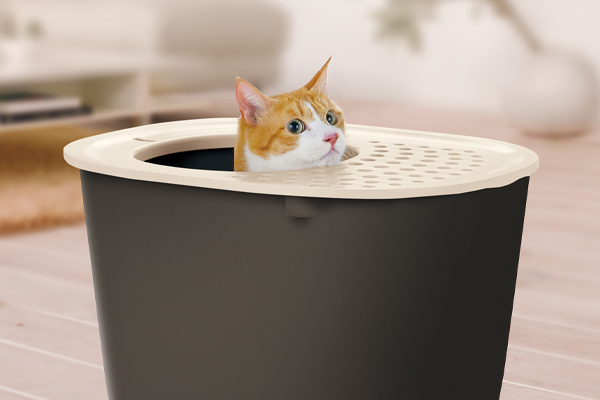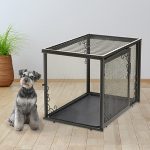
Cats are notoriously clean animals. Nature has selected this trait as being supremely beneficial for cats in the wild. Luckily, domestic cats have retained this behavior. In the wild, cats bury or cover their excrement so other more dominant cats or predatory animals won’t know they are around. It’s one way they remain secretive and elusive, and this survival mechanism has served them well.
Very seldom do cats need to be bathed. They are essentially the only self-cleaning thing in most homes. Healthy cats can spend up to 50% of the waking day grooming themselves to maintain their cleanliness. A cat’s barbed tongue is purrfect for removing loose fur, food, and other odors that could give their location away. They are also able to control their body temperature, rid their coat of fleas and other pests, increase circulation, and speed recovery from injury by licking with their tongue. Plus, it just feels good to them.
With cats being so clean, and thus expecting their environment to remain clean as well, it’s no surprise that we must keep their litter box(s) tidy. A well-kept litter box not only helps a cat stay mentally and physically healthy, but it also allows our feline companions to remain interested in using it for doing their “business”. Otherwise, they could opt for a cleaner area of the house which may or may not contain a litter box.
The suggestions and tips below are a useful collection of information about litter boxes and supplies, why they are important, how it’s vital to maintain a clean litter box to avoid bacterial breeding grounds or other disease-causing organisms, and how the task of cleaning a litter box can be made easier on both you and your cat.
Think “Inside” the Box
Instead of thinking outside the box, think “inside” the box – as in how the litter box is shaped on the inside.
Shape – Whether your litter box is rounded or rectangular, just make sure your litter scoop can clean all areas.
Wall Size - is another consideration. The higher the walls the less kitty litter is sprayed around.
Box Size - Be sure that the litter box is large enough to accommodate your full-grown cat or cats.
Enclosed vs. Open - If a lid is desired, how bad will the enclosed space smell versus how much litter is kept in the box because it has a lid? Cats enjoy their privacy, but can’t stand a bad smelling area. It’s a tradeoff for sure. Can an enclosed litter box be kept clean enough for your cat to want to use it, or is an open, high walled box a better solution…assuming it can be kept clean enough to not radiate smells to the rest of the house. In the end, if your cat doesn’t like a particular box he won’t use it. You may even want to purchase both an open and closed litter box to see which one is the most preferred. Richell features a nice combination of the two with their PAW TRAX Top Entry Cat Litter Box which incorporates tall walls and an airy lid with holes that brush off residual litter from paws. Strive to get at least one litter box per cat with one extra in case a preferred box is occupied when a cat wishes to use that particular box.
Litter Box Mat
When cats leave a litter box and there isn’t anything on or near the box to trap or remove excess litter, they will carry litter particles throughout the house on their paws. A good mat that employs a different material than other house mats or rugs is important to place beneath the litter box. The mat will catch pieces of litter instead of them being transported throughout your home. Not only does it curb messes, but it keeps everyone healthier. Make sure the mat extends outward on all four sides to catch as many particles as possible. A word of caution: If the litter box mat is made of the same material as other mats or rugs in the house, your cat may think it’s ok to soil on them as well since it soils in the litter box which sits on the same kind of mat/rug.
Super-Duper Pooper Scooper
A great investment to make when you have a cat is to purchase a well made, durable, and sufficiently large litter scoop. A very thin handled plastic scoop can break when large clumps are dug out of a litter box, and metal scoops can rust after numerous uses. An ergonomically shaped wide and deep thick plastic or aluminum scoop may be the cat’s meow when it comes to strength, durability, and effectiveness. That way the scoop won’t bend, break or rust when scooping out heavy, urine-clumped litter.
Scoop Often
The more often a litter box is cleaned - the easier it is on everyone. When a litter box goes multiple days before it is cleaned, it is harder to pick everything out and the more likely it is that your cat may decide to do their business elsewhere. Cats crave a clean place to eliminate. If it’s not to their liking they will often hold their waste and that can lead to kidney or bladder damage. Daily cleanings also keep odors down and decrease the risk of cat to human disease transmission. This is especially true if someone in the household is pregnant. Pregnant women should avoid cleaning cat litter boxes because of the threat of being affected by toxoplasmosis which can cause birth defects when a fetus is exposed to it. Because the Toxoplasma gondii spores require several days of incubation time before they can become infectious, it’s important that any litter boxes are cleaned daily and that gloves and even a mask be worn.
Location, Location, Location
As with real estate, it’s all about location, location, location when you set up your cat’s litter box. It can be out of the way to reduce odors and litter being spread throughout the house, but ultimately your cat will help you decide where they like it. With any luck, it will be an agreeable place for you both.
A word of caution: The litter box needs to be a fair distance from a cat’s food and water bowls so cross-contamination doesn’t occur. If potentially contaminated litter is accidentally spread to a food or water bowl and consumed, you may soon have a sick cat on your hands.
Litter Boxes that Clean Themselves
Not to be outdone by self-cleaning ovens and robot vacuums, there is now a good selection of very efficient self-cleaning litter boxes. Yes, that’s right. If you hate to de-clump your cat’s litter box every day, today’s modern innovation has you covered. Quiet, motorized rakes will sift through clumping litter and deposit any material in a self-closing container, clean up and be ready for the next deposit. They can be pricey, but it may be worth only having to deal with things weekly instead of each day. And your cat may thank you as well, especially if you are in the habit of forgetting or not wanting to clean the litter box every day or two.
Litter Type
There are many types of cat litter now available for purchase. It used to be that clay litter was the only option – but all that has changed. Litter can be chosen based on cost, absorbency, amount of dust given off, scent, clump ability, and availability, but it ultimately boils down to what your cat likes or will tolerate. Most cats like fine-grained litter, perhaps because the finer grains are softer.
When your cat, and hopefully you, is happy with the litter choice, be sure to keep using that type of litter. The last thing anyone wants is for your cat to do their business outside the litter box. Some cat parents prefer scented litter, but the smell could discourage usage of the litter box. If this is the case and non-scented litter will be used, a layer of baking soda can be added to the bottom of the litter box that will aid in absorbing smells without offending your cat. And a good thing to remember: Most cats won’t use a litter box that has more than two inches or so of litter. The exception is the long-haired cat family which prefers less litter and a smooth surface.
If you have an outdoor cat that you wish to convert to an indoor cat, it can be challenging getting them to use commercial litter since they are used to burying things in the great outdoors. They may even try to use your flower pots as a litter box since they are used to their litter being dirt. To avoid this possibility you can place rocks or decent size stones in your flower pots to discourage use as their restroom.
PAW TRAX Rimmed Cat Litter Pan
Cleaning the Litter Box
As mentioned above, cats are very tidy and take great care in cleaning themselves, but it’s up to cat parents to clean up their left-behind mess each day – or purchase an automatic cleaning litter box. And if there are multiple cats or boxes, that chore could end up taking place several times a day. And while cleaning their litter box(s), it’s helpful to wear gloves and in some cases a mask if you want to be extra cautious or you are sensitive to dust.
The methods below for cleaning a litter box are helpful, especially if you are new to cat ownership. For veteran cat lovers, some of this information might help you tweak your current routine so it is even more efficient. Of course, the following procedures take into account that you are utilizing litter that clumps and not regular litter.
Scoop the Poop - The first order of business is to find all the solids. By sifting through the box to the bottom and around all the sides and corners with your litter scoop, you will find all the solids that need to be scooped out. Having a disposal bag handy at this point is helpful so you aren’t scattering litter and other material across the house to the trash can.
Wipe Warm – Be sure to wipe down the sides of the litter box with warm water or mild cleaning solution if you see any material stuck to the edges. You will want to eliminate any source of odor so your cat will want to revisit their litter box instead of a clean corner of your home.
Mat Makeover - The mat will typically house errant litter and should be cleaned by moving the litter box to a sanitary spot and gathering the mat for a shakedown over your trash can. Once the mat is cleaned it can again be placed under the litter box. It’s good to wash the mat every few weeks to sanitize and clean it thoroughly.
Replace and Remake – You just scooped out clumps of litter, so that material will need to be replaced with fresh litter and the litter smoothed out for the next round of deposits. If you want to cut odors even more, you can sprinkle some baking soda into the litter to eliminate even more odors until the next time all the litter is changed.
Once a week, or more often if you have several cats, the litter box should be emptied, the box thoroughly cleaned and new litter installed. You may be able to get away with doing this once every couple of weeks if you are proactive and clean it well each day. When you clean the box be sure not to use bleach without diluting it, ammonia, or citrus-centered cleaners since the residual smell can be too strong for your cat to feel comfortable using the box.
Potty Training your Cat
Training your cat to use the toilet is possible and it has been done. If you’ve ever seen the movie “Meet the Parents”, you might remember Jinxy the toilet trained cat. But toilet training also takes cats out of their natural environment and tendency to go and then bury their waste. It could also lead to more accidents if the toilet lid is down, the door is closed, or someone is occupying the bathroom when your cat “needs to go”. And heaven forbid your cat falls into the toilet bowl and gets all wet. That could have ramifications for years. It’s certainly possible to toilet train a cat and maybe that sounds appealing, but you may want to at least have a litter box as a backup if you try.
When it’s all said and done, a clean cat litter box is very important and is worth its weight in gold as the saying goes. Not only does a clean litter box allow for a more appealing ambiance within the home, but it is much healthier for your feline companion as well. Vet visits will likely be reduced, your cat will be happier and you will enjoy your cat a lot more when it is clean and content.
#happycats
 Dog Park 101: Tips for Visiting Your First Off-Leash Dog Park
Dog Park 101: Tips for Visiting Your First Off-Leash Dog Park
12.01.2020
So you’re thinking about visiting an off-leash dog park for the first time. Or perhaps you’ve already been to a dog park and want to see if you got things right... >>> READ MORE
 Why Crate Training is Important
Why Crate Training is Important
10.15.2020
If this piece were instead titled “Why Crate Training isn’t Important”, it would be a much shorter read and one could immediately go about their day. >>> READ MORE
 How to Keep Your Cat Happy & Healthy
How to Keep Your Cat Happy & Healthy
09.14.2020
As we head into September and begin winding down summer activities in lieu of cooler fall adventures, it’s the perfect time of year to start spending more time with our feline companions. And as it just so happens, ... >>> READ MORE
Please complete this form and click "Submit". Our Customer Support team will gladly address your request and respond in a timely manner.
Richell USA, Inc.
Copyright © Richell, Inc.. All rights reserved